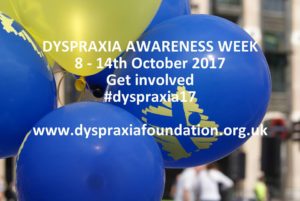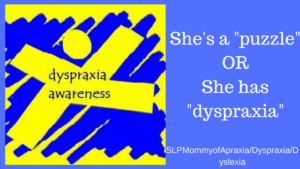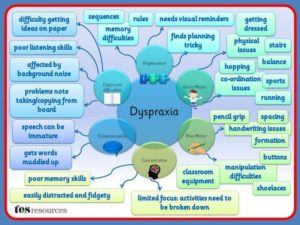“She’s a puzzle” or…. she has dyspraxia
It’s no secret apraxia, dyspraxia, and developmental coordination disorder are not well known. Ask any parent, or heck, even any professional, and you will find out pretty quick few people really know what it is.
Hey, I was one! I was one of those professionals before my daughter was born. Here’s the thing. I had my bachelor degree and masters degree AND my SLP CCC certification, and yet I had very few pages detailing apraxia of speech. Dyspraxia? Developmental Coordination Disorder? Pretty sure I never even learned those two terms. My masters degree program taught us to research, but should I have really had to “google” to figure out how to treat a kid with apraxia? Shouldn’t that have been addressed in school? Shouldn’t dyspraxia and developmental coordination disorder at least been given a shoutout like all the other rare disorders I had to remember including Fragile X and Rett Syndrome?
I digress though. THIS is why we need dyspraxia awareness week, this year October 8th through the 14th. Oh, I should mention awareness week was started in the UK by the dyspraxia foundation. I hope to carry it over here to the U.S., because just because my daughter lives here it doesn’t mean it’s any less prevalent. 
When I took my daughter in for her first Child Find Evaluation, I remember the PT(physical therapist) telling me,
“She’s a puzzle.”
If you are a professional reading this like I was once, you probably didn’t think much about that last statement.
“She’s a puzzle.”
We all have one of those kids on our caseloads that we just can’t quite put our finger on exactly what’s going on; and part of the diagnostic process is testing a kid and finding out all the pieces to the puzzle to help develop the best treatment plan for the child. Sounds about right.
I can tell you though, hearing your child is a puzzle is quite frankly heartbreaking as a parent. A puzzle is something you haven’t figured out yet. As a noun, the definition of a puzzle is, ” a game, toy, or problem designed to test ingenuity or knowledge.” As a verb, the definition of puzzle is “to feel confused because they cannot understand or make sense of something.” So, with those two things in mind, think of how you might feel when professionals who treat children who exhibit similar problems like your child tell you “She’s a puzzle.”
I don’t want professionals to tell me she’s a puzzle. I don’t want to know that she’s so unusual that her very being challenged your knowledge, or that you are confused by her. I mean seriously? As I’m further on in this journey now, and as I’ve been able to talk to numerous parents nationwide who have a child with apraxia and dyspraxia, I can tell you she’s not a puzzle at all. Her presentation, to varying degrees, is exactly the same presentation as other children with her disability. This includes a high likelihood of sensory processing disorder and attention problems to name a couple. Despite this, I was still told last week by someone that her attention issues are a “puzzle.” Sigh
This fabulous research article probably puts it best in their opening statement positing,
Dyspraxia is an enigma to many people, both professional and lay alike
Enigma now! It’s ridiculous if it weren’t completely true. Dyspraxia IS an enigma to both professional and lay people alike. Listen, the only puzzle, or enigma that I can see after being on this journey for about 5 years now is this. It’s puzzling THAT PROFESSIONALS IN THE FIELD don’t know about apraxia and dyspraxia. Now THAT is the puzzle. I’m including myself friends. I’m not exempting myself. How is it, that according to some data it’s prevalent in as high as 10% of the population, yet my daughter is “a puzzle.” There’s something wrong with that.
A simple google search of dyspraxia, apraxia, and dyslexia though will reveal a list of symptoms that are exactly what my daughter has and experiences. She’s not a puzzle at all. She fits in all the little boxes of these graphics completely, like the one below. I could quite literally check every…single….box. I guess all the separate boxes resemble a puzzle, but if you put them together they all fit perfectly to complete that big box in the middle: dyspraxia.
Ultimately though, this article is more than a rant. This is a dyspraxia awareness post and this is what I want to see. I want to see these disorders as understood and as well known as other relatively rare global developmental delays like Down Syndrome. When a professional hears the word “Down Syndrome,” I can guarantee a list of characteristics common to those with DS will pop into their head. There are always varying severities of course; but a professional is going to know what to expect and be better equipped to help them.
I hope there is a day no other person with dyspraxia is told they are a puzzle or an engima and instead is greeted with, “Oh dyspraxia? Okay. We know exactly how to help you.”

